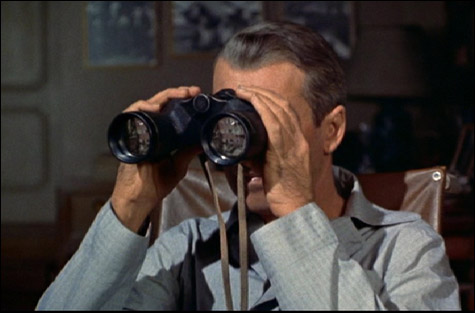
REALITY TV: In his classic 1954 film, each of Hitchcock’s windows affords a glimpse into a neighbor’s life — or at least into how a voyeur might imagines a neighbor’s life to be. |
“I’m not much on rear-window ethics,” quips Lisa Fremont (Grace Kelly), long-suffering fiancée of obsessive voyeur L.B. Jefferies (Jimmy Stewart), in Alfred Hitchcock’s 1954 masterpiece. She’s referring to the increasing cold-bloodedness of her beau’s surveillance of his neighbors, his eagerness to impugn them with the basest of motives and behavior, his indifference to the common virtue of charity. Not unlike the ethics of the filmmaker himself, perhaps, except that Hitchcock turned his cold-blooded observations into disturbing illumination.
Five decades later, filmmakers and audiences are still trying to catch up with the master on the politics of peeping. In search of moral and cultural clarity, or at least audience appeal, recent films have looked back to Rear Window, a movie epitomizing the essentials of cinema and civilization: voyeurism, paranoia, and repression. Impulses which, if anything, are more urgent now than ever.
In short, Rear Window has become high concept. Look at the top of the box office for the past three weeks and you’ll find the surprise hit Disturbia, a note-by-note reprise of Hitchcock’s film recast with teens, reset in the suburbs, and tarted up with a 21st-century slasher sensibility. This week, Civic Duty returns the story to the adult world and injects a post-9/11 twist. Next week, the Scottish Red Road adds feminism, Big Brother, and startling sex to the scenario.
Are we in for a renaissance of Hitchcockian thrillers that jangle the nerves as they reflect our deepest anxieties? Probably not. Though Andrea Arnold’s Red Road possesses some of the legendary director’s greatness, no one will mistake Shia LaBeouf and Sarah Roemer in Disturbia for Jimmy Stewart and Grace Kelly. As for Disturbia’s director, D.J. Caruso, all his Friday the 13th cut-ups don’t compare with a single, sublimely framed glance from Raymond Burr in Rear Window.
But this isn’t about quality, it’s about Zeitgeist. Hitchcock’s film came out in the wake of the McCarthy investigations and the Korean War. The government stoked the nation’s fears of subversive infiltrators, encouraged citizens to spy on each other, compelled those under investigation in Hollywood to name names and point fingers. A culture and politics of fear prevailed.
Sound familiar? Since 9/11 we’ve grown used to the idea that not only should we suspect everyone of evildoing, but that we should also welcome the intrusion of government surveillance into our private lives. This mood has only intensified since the massacre at Virginia Tech. The second most-asked question about that outrage (after the unanswerable: why did he do it?) has been, why didn’t anyone notice that the perpetrator was a dangerous whack job and do something about it? So maybe the lesson to be learned from Virginia Tech is that we haven’t been paranoid or suspicious or intrusive enough.
Rear Window and the recent films it has inspired suggest a different response. In these films, more suspicion and surveillance doesn’t lead to more understanding, but to alienation — not just from our neighbors, but from ourselves. The search for the truth can sometimes lead into the labyrinth of paranoia. And the evil we see in others can sometimes be a reflection of our own fears and desires.